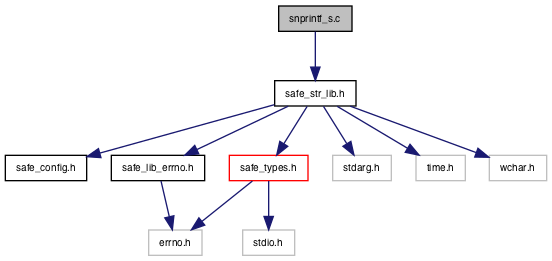snprintf_s.c File Reference
#include "safe_str_lib.h" Include dependency graph for snprintf_s.c:
Include dependency graph for snprintf_s.c:Functions | |
| EXPORT int | snprintf_s (char *restrict dest, rsize_t dmax, const char *restrict fmt,...) |
The truncating snprintf_s function composes a string with same test that would be printed if format was used on printf. More... | |
Function Documentation
◆ snprintf_s()
| EXPORT int snprintf_s | ( | char *restrict | dest, |
| rsize_t | dmax, | ||
| const char *restrict | fmt, | ||
| ... | |||
| ) |
The truncating snprintf_s function composes a string with same test that would be printed if format was used on printf.
Instead of being printed, the content is stored in dest. More than dmax - 1 characters might be written, so this variant is unsafe! Always use sprintf_s instead. The resulting character string will be terminated with a null character, unless dmax is zero. If dmax is zero, nothing is written and dest may be a null pointer, however the return value (number of bytes that would be written) is still calculated and returned. Warning: Unlike the safe variant sprintf_s, snprintf_s does not guarantee that the buffer will be null-terminated unless the buffer size is zero.
- Note
- POSIX specifies that
errnois set on error. However, the safeclib extendedES*errors do not seterrno, only when the underlying systemvsnprintfcall fails,errnois set.
- Remarks
- SPECIFIED IN
- C11 standard (ISO/IEC 9899:2011): K.3.5.3.6 The snprintf_s function (p: 594-595) http://en.cppreference.com/w/c/io/fprintf
- only included in safeclib with
–enable-unsafe
- Parameters
-
[out] dest pointer to string that will be written into. [in] dmax restricted maximum length of dest[in] fmt format-control string. [in] ... optional arguments
- Precondition
- Neither
destnorfmtshall be a null pointer. -
dmaxshall not be greater thanRSIZE_MAX_STR. -
dmaxshall not equal zero. -
dmaxshall be greater thanstrnlen_s(dest, dmax). -
fmtshall not contain the conversion specifiern. -
None of the arguments corresponding to
sis a null pointer. (not yet) - No encoding error shall occur.
- Returns
- Number of characters not including the terminating null character (which is always written as long as buffer is not a null pointer and
dmaxis not zero and not greater thanRSIZE_MAX_STR), which would have been written todestifdmaxwas ignored, or a negative value if a runtime constraints violation or an encoding error occurred.
- Return values
-
-ESNULLP when dest/fmtis NULL pointer-ESZEROL when dmax= 0-ESLEMAX when dmax>RSIZE_MAX_STR-EINVAL when fmtcontains n
- See also
- sprintf_s(), vsnprintf_s()
